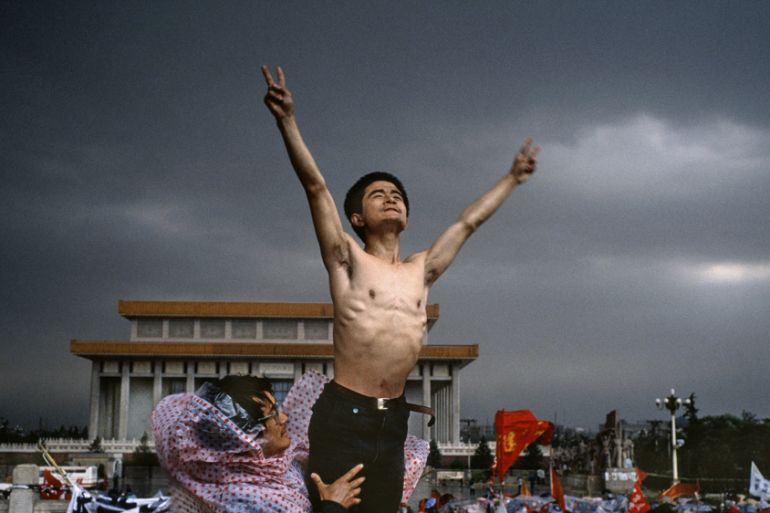
Following Beethoven’s Ninth
Two centuries after it was written, the symphony continues to inspire struggles for freedom and survival.
Editor’s note: This film is no longer available online.
Following Beethoven’s Ninth is the story of people whose lives have been transformed, repaired and healed by the message of Beethoven’s Ode to Joy and his final symphony, ‘All Men Will Be Brothers’.
Keep reading
list of 4 itemsIsrael qualifies for Eurovision final amid Gaza war protests
Slum to stardom: Indonesian film director Joko Anwar is riding high
The surfer chef behind South Africa’s first fine dining halal restaurant
At Tiananmen Square in 1989, students played the Ninth over loudspeakers as the army came in to crush their protests for freedom. In Chile, women under the Pinochet dictatorship sang the Ninth at torture prisons, and those inside took hope when they heard the music.
Shortly after the Berlin Wall, symbol of division and oppression, came down in November 1989, Leonard Bernstein conducted Beethoven’s Ninth as an “Ode to Freedom” on both sites of the Berlin Wall to celebrate this historic moment.
Part road trip, part adventure story this film is an intimate exploration as to the enduring impact and meaning of this moving, iconic piece of music that continues to inspire and uplift nearly two centuries after being first performed.
![People are sitting and standing on the Berlin Wall in front of the Brandenburger Tor celebrating the new year and the opening of the wall [DPA]](/wp-content/uploads/2015/05/aba497514f664866be6c99bba0e0dcbf_18.jpeg)
FILMMAKER’S VIEW
By Kerry Candaele
I fell in love with Beethoven’s Ninth not as a filmmaker, but as a human being. The music came to me first, and I lived with the Ninth for years before I discovered that this greatest of symphonies had a grand history in our time.
This film tells a bit of the story of the composer and his struggle to create his final symphony, but more importantly, the film tracks the global impact of the Ninth as it travelled across borders, inspiring those in dire situations, challenging governments who needed challenging, and helping people who required healing music after sometimes bitter confrontation.
As I studied the Ninth and Beethoven himself, I found that the symphony has had a lasting political presence in the 191 years since its first performance in 1824.
![At Beijing's Tiananmen Square protests in 1989, students played the Ninth over makeshift loudspeakers [MAGNUM]](/wp-content/uploads/2015/05/ccc87097fcc94f789f178d8458a90918_18.jpeg)
At Tiananmen Square in 1989, for example, students played the Ninth over makeshift loudspeakers as the troops came in to crush their democratic moment. Chinese dissident Feng Congde told me how he and his fellow protesters wanted the world to hear their message of hope for China, and how the Ninth summed up that hope.
When the Berlin Wall cracked in 1989, and families and friends who had been separated for three decades embraced again, Leonard Bernstein performed Beethoven’s Ninth as an “Ode to Freedom” on both sides of the Wall.
In Chile, the “Ode to Joy” was used by women who sang the “Himno a la Alegria” (Hymn to Happiness) in the streets during the Pinochet years, sometimes outside of torture prisons where those trapped inside heard the street chorus offering both open arms and hope.
The Chilean poet and musician Isabel Lipthay took our crew on a 2,000-kilometre journey down the coast of Chile to the Island of Chiloe to talk with a former political prisoner who heard those women singing for him and others.
![Thousands of students stage demonstrations in Beijing's Tiananmen Square against the Chinese government's hardline policies against democratic reform and freedom of speech [Corbis]](/wp-content/uploads/2015/05/db81fb4598164927848ac9540f820dd7_18.jpeg)
In the Ninth, Beethoven mixes strong accents of despair and disillusionment, even outright terror, and balances these emotions with musical acts of overcoming, noble and life-affirming artistic creation, and, at times, joy. Within the anguish of his life and music there is Beethoven’s amor fati – the love of his fate – and a stoicism that accompanies acceptance of whatever living might bring.
When Beethoven played his own witness to the cosmic joke that was his increasing deafness he wrote in his famous 1802 Heiligenstdat Testament, “Perhaps I shall get better, perhaps not; I am ready.”
And in the midst of this crisis he wrote to Franz Gerhard Wegeler, “I will seize fate by the throat; it shall certainly not bend and crush me completely.” Shall not “crush me completely.” We have not had many such testaments to heroism – a warrior’s spirit dedicated to creation, not destruction, and open to a life lived brilliantly but under the sign of a personal cataclysm.
I kept these words in mind as I travelled across five continents and 15 countries making Following Beethoven’s Ninth. And as any filmmaker will tell you, meeting people who somehow summon the strength and courage to be, like Beethoven, tough and resilient against all odds, is one of the great joys of this art. My deepest thanks goes out to those tenacious individuals I met along the road.
![Human rights activist recall victims of dictatorship, Santiago, 1988 [Marcelo Montecino]](/wp-content/uploads/2015/05/70fccb6637f44f6ea3ee590418f9fa3f_18.jpeg)